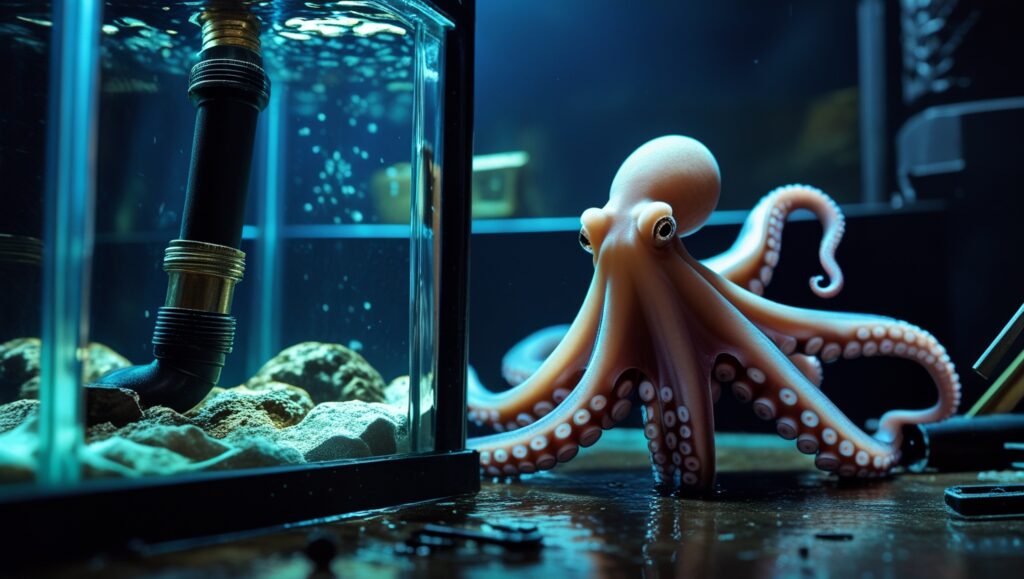The ocean is home to many fascinating creatures, but few are as mysterious and intriguing as the octopus. With its eight arms, bulging eyes, and remarkable intelligence, the octopus has captured the imagination of scientists and animal lovers alike. But is the octopus the smartest animal on Earth? Let’s dive into the incredible world of these underwater wonders and uncover what makes them so special.
Brainpower Beyond Compare

Octopuses are part of a group of animals called cephalopods, which also includes squid and cuttlefish. What sets the octopus apart is its extraordinary brainpower. Despite having no backbone, octopuses have about 500 million neurons—a number comparable to that of a dog. Most of these neurons are located in their arms, allowing them to perform tasks independently of their main brain.
This decentralized nervous system enables octopuses to solve problems, use tools, and even escape from tricky situations. For example, they’ve been known to open jars to get to food inside or sneak out of aquarium tanks to explore their surroundings.
Fun Fact: Each arm of an octopus has its own mini-brain, allowing it to taste, touch, and move independently.
Masters of Disguise

Octopuses are also experts in camouflage. They can change the color, texture, and even shape of their bodies to blend into their surroundings. This ability not only helps them avoid predators but also allows them to sneak up on prey. Their skin contains specialized cells called chromatophores, which expand and contract to create different colors and patterns.
In addition to blending in, some octopus species, like the mimic octopus, can imitate other animals such as lionfish or sea snakes to scare off predators. This level of adaptability is a testament to their intelligence and creativity.
Fun Fact: An octopus can change its color in less than a second, making it one of the fastest camouflage artists in the animal kingdom.
Problem Solvers Extraordinaire

Octopuses are known for their problem-solving abilities. In laboratory settings, they have solved mazes, navigated complex puzzles, and even learned to unscrew lids to access food. Their curiosity and ability to think critically make them one of the most intelligent invertebrates.

One famous octopus named Inky made headlines when it escaped from its aquarium in New Zealand. Inky climbed out of its tank, slithered across the floor, and made its way to a drainpipe that led to the ocean. This daring escape highlights the octopus’s resourcefulness and determination.
Fun Fact: Octopuses can remember solutions to problems and apply what they’ve learned in new situations, showcasing impressive memory skills.
Social Behavior and Play
While octopuses are generally solitary creatures, they display surprising social behaviors in certain situations. For instance, they’ve been observed playing with objects, such as bouncing bottles or shells, in a manner similar to how dolphins and primates play. Play behavior is often linked to intelligence, as it requires curiosity and creativity.
Scientists have also noticed that octopuses can recognize individual humans. In aquariums, they often show different reactions to different keepers, demonstrating a level of awareness uncommon in most marine animals.
Fun Fact: Octopuses have three hearts and blue blood, which helps them survive in low-oxygen environments.
Short Lives but Big Impact
Despite their intelligence, most octopuses have relatively short lifespans, ranging from six months to a few years. This limited time means they must quickly learn and adapt to survive. Their ability to thrive in diverse environments, from coral reefs to deep-sea trenches, is a testament to their resourcefulness.

Octopuses lay thousands of eggs, and the mother dedicates her final days to guarding and caring for them. She doesn’t eat during this time, ensuring her offspring have the best chance of survival. This selflessness is another remarkable aspect of octopus behavior.
Fun Fact: The giant Pacific octopus can lay up to 74,000 eggs at once, and the hatchlings are about the size of a grain of rice.
Are Octopuses the Smartest Animals?

While it’s hard to compare intelligence across species, the octopus certainly stands out among invertebrates and even rivals some vertebrates. Their ability to learn, solve problems, and adapt to new environments places them in a league of their own. However, their intelligence serves a different purpose than that of land animals like primates or dolphins. Octopuses use their brainpower primarily for survival, mastering skills like camouflage, hunting, and escaping predators.
Final Thoughts
The octopus is more than just a sea creature with eight arms; it’s a marvel of nature with abilities that continue to astound scientists. Whether it’s their problem-solving skills, incredible camouflage, or playful behavior, octopuses prove that intelligence comes in many forms. So, is the octopus the smartest animal on Earth? It might just be, depending on how you define intelligence. One thing is certain: the octopus is a true testament to the wonders of the natural world.
What do you think about these incredible creatures?



